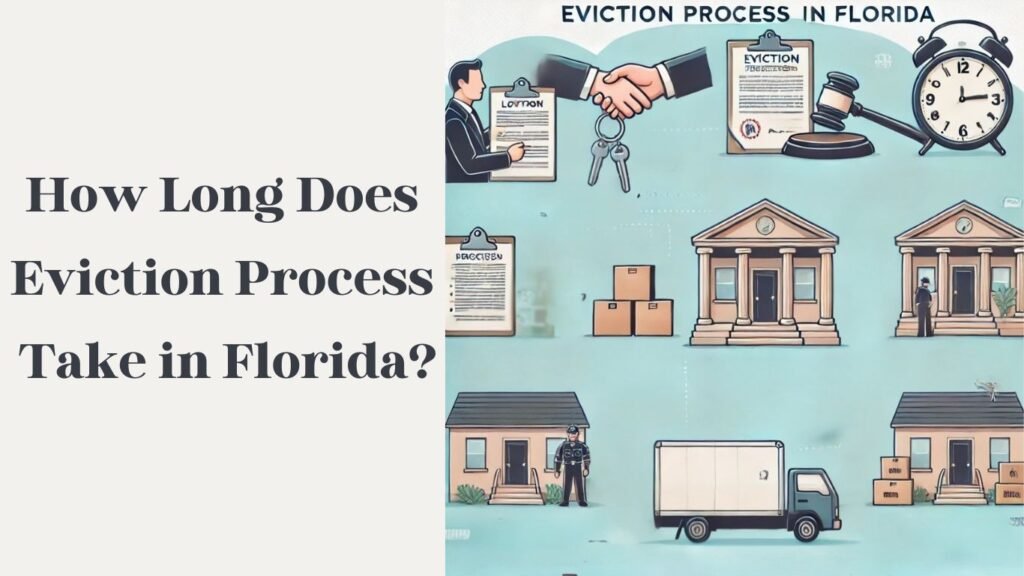Evictions are often a landlord’s last resort, but sometimes they become necessary—whether due to unpaid rent, lease violations, or property damage. For Florida landlords, understanding the eviction timeline is crucial, especially since recent legal changes have impacted the process.
In 2023, updates to the Florida Landlord and Tenant Act (Florida Statute 83) overruled many local eviction ordinances, streamlining procedures statewide. If your tenant is no longer complying with the lease, knowing the proper steps and legal requirements can make the process smoother and help you regain control of your rental property efficiently.
So, how long does an eviction take in Florida? The answer depends on factors like the reason for eviction, court schedules, and whether the tenant contests the process. In this guide, we’ll break down the eviction timeline, from serving notice to regaining possession of your property, so you can navigate the process with confidence.
What is the eviction process?
The eviction process is the legal procedure a landlord must follow to remove a tenant from a rental property due to lease violations, non-payment of rent, property damage, or other breaches of contract.
It involves serving the tenant with a formal notice, filing an eviction lawsuit if the issue is not resolved, and obtaining a court order for possession. The process must adhere to state laws to ensure fairness and avoid legal disputes.
Once the court grants an eviction order, law enforcement, typically the sheriff’s office, enforces the removal of the tenant if they do not vacate voluntarily. However, tenants have the right to contest the eviction, which can extend the process.
If handled improperly, a landlord could face delays, fines, or even legal repercussions. Therefore, understanding the correct legal steps and ensuring compliance with state laws is crucial to a smooth and lawful eviction process.
What’s new in eviction rules in Florida for 2025?
In recent years, Florida implemented significant changes to its eviction laws to balance the rights of landlords and tenants more effectively. One of the most notable adjustments is the extension of notice periods required to terminate various types of tenancies:
- Week-to-week tenancies: The notice period remains at 7 days.
- Month-to-month tenancies: The required notice period has increased from 15 days to 30 days.
- Quarter-to-quarter tenancies: The notice period is set at 30 days.
- Year-to-year tenancies: Landlords must now provide a 60-day notice, an increase from the previous 30-day requirement.
These changes mean that landlords must provide longer notice periods before terminating tenancies, allowing tenants more time to prepare for relocation. If a tenant remains in the property beyond the specified notice period, landlords have the legal grounds to initiate an eviction lawsuit.
Additionally, other modifications affecting tenancy laws, though not directly related to evictions, include the option for landlords to accept a fee in lieu of a security deposit, mandates to return security deposits within a specified timeframe, caps on late fees, and requirements for conducting background checks on employees and contractors associated with rental properties.
These updates aim to create a more standardized and fair process for both landlords and tenants across Florida.
How Long Does the Eviction Process Take in Florida?
The eviction process in Florida typically takes anywhere from 20 to 37 days, depending on the specific circumstances of the case. If the eviction is uncontested and follows a straightforward legal path, the process may take as little as 7 to 15 days.
However, delays can occur due to tenant disputes, court backlogs, or procedural errors, which may extend the timeline beyond a month.
Factors That Influence Eviction Timelines in Florida
Several key factors affect how long an eviction takes in Florida, including:
- Reason for Eviction – Evictions for non-payment of rent tend to be quicker than those involving lease violations or illegal activity.
- Tenant Response – If a tenant contests the eviction in court, it can add several weeks to the process.
- Court Processing Times – Some counties may experience court delays, especially if there is a backlog of eviction cases.
- Legal Compliance – Landlords must strictly follow Florida’s eviction laws. Any mistakes in filing paperwork or serving notices can cause significant delays.
Step-by-Step Breakdown of the Eviction Timeline
Below is a general timeline of eviction proceedings in Florida, assuming everything goes smoothly and without disputes:
1. Serving the Eviction Notice (3 to 5 Days)
The eviction process begins with serving an eviction notice to the tenant. The type of notice required depends on the reason for eviction:
- Non-payment of rent → 3-day notice to pay or vacate.
- Lease violation → 7-day notice to fix the violation or vacate.
- Month-to-month termination → 30-day notice (as of 2025, previously 15 days).
If the tenant does not comply or vacate, the landlord can proceed with filing an eviction lawsuit.
2. Filing the Eviction Lawsuit (2 to 5 Days)
If the tenant refuses to leave after receiving notice, the landlord can file an eviction lawsuit (unlawful detainer complaint) with the county court. This step includes:
- Paying a filing fee (varies by county).
- Submitting required legal documents proving the eviction case.
- Receiving a case number and a court date (if needed).
3. Serving Court Eviction Papers to the Tenant (1 to 3 Days)
Once the lawsuit is filed, the tenant must be officially served with court eviction documents. This is usually done by:
- A process server or sheriff.
- Posting the notice on the tenant’s door if they cannot be reached.
After being served, the tenant has a deadline to respond to the lawsuit.
4. Waiting for Tenant Response (1 to 7 Days)
- If the tenant does not respond → The landlord can request a default judgment, leading to a faster eviction process.
- If the tenant contests the eviction → The case goes to a court hearing, adding 1 to 3 weeks to the timeline.
5. Court Decision or Hearing Date Assignment (5 to 7 Days)
If the eviction case goes to court, a judge will review the case and issue a ruling. Possible outcomes:
- If the landlord wins → A writ of possession is granted.
- If the tenant wins or raises valid defenses → The eviction may be delayed or dismissed.
6. Issuing a Writ of Possession (1 to 3 Days)
Once the court approves the eviction, the writ of possession is filed with the clerk of court. This document allows the sheriff to physically remove the tenant from the property.
7. Sheriff Executes Writ of Possession (1 to 7 Days)
- The sheriff posts a final 24-hour eviction notice on the tenant’s door.
- If the tenant still does not leave, the sheriff removes them from the property.
Total Estimated Eviction Timeline in Florida
What Happens After the Eviction?
- The tenant has 24 hours to vacate the property after the sheriff posts the final notice.
- If the tenant does not leave, law enforcement officers will remove them from the premises.
- The landlord can then change the locks and regain possession of the property.
8 Reasons Behind Evicting Guests from a Rental Property in Florida in 2025?
In 2025, Florida landlords or property owners can evict guests from a vacation rental for several reasons, following state laws and lease agreements. Some of the most common reasons include:
1. Non-Payment of Rent or Fees
If a guest fails to pay the agreed-upon rental fees, service charges, or security deposit, the property owner has the right to terminate their stay and initiate an eviction.
2. Overstaying the Rental Period
If a guest refuses to leave after their rental agreement expires, they may be classified as a holdover tenant, requiring legal eviction proceedings to remove them.
3. Violating the Rental Agreement
Most vacation rentals have rules regarding maximum occupancy, pet policies, smoking restrictions, and prohibited activities. If a guest violates these terms, the owner can terminate their stay.
4. Property Damage or Misuse
If a guest causes significant damage to the rental property, furniture, or appliances, or engages in activities that harm the property’s condition, the owner may take legal action to remove them.
5. Disturbing the Peace or Illegal Activity
Guests engaging in illegal activities (such as drug use, vandalism, or unauthorized parties) or disturbing neighbors with excessive noise can be evicted immediately to protect the property and community.
6. Unauthorized Subletting or Hosting
If a guest sublets the rental without the owner’s permission (such as re-listing it on Airbnb or VRBO) or brings in additional, unauthorized occupants, this may be grounds for eviction.
7. Health and Safety Violations
If a guest engages in behavior that jeopardizes the health and safety of others—such as tampering with smoke detectors, blocking emergency exits, or engaging in hazardous activities—the property owner may terminate the stay.
8. Fraud or Misrepresentation
If a guest uses stolen credit cards, false identification, or provides misleading information to secure a rental, the owner has the right to remove them immediately.
Conclusion
While this overview provides a general understanding of the steps involved, the actual duration can vary significantly based on numerous factors, including the specific circumstances of the case, court schedules, and the responsiveness of all parties involved.
It’s crucial for both landlords and tenants to familiarize themselves with Florida’s eviction laws and seek legal counsel when necessary to ensure their rights are protected and the process is handled efficiently.





